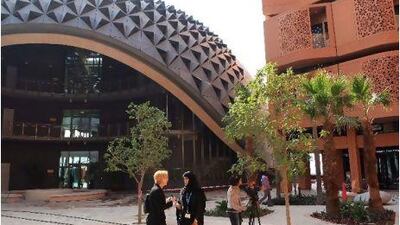Masdar, the Abu Dhabi Government's clean energy company, has cut another US$2.5 billion (Dh9.18bn) from the cost of its carbon-neutral city project, reducing the price tag to $16bn.
The savings result from a recent review that abandoned a costly pod transit system, removed a raised podium design for the buildings and scrapped a plan to instal solar panels on all roofs.
The project's estimated cost has fallen by a total of $6bn, or 27 per cent, from $22bn when the original plan for Masdar City was unveiled less than three years ago.
Masdar completed a review of the master plan in October, dropping the price tag to $18.5bn, even as it extended the expected date for completion of the development by 10 years to 2025.
Dropping the podium on which the community would be built above a layer of infrastructure and settling on a plan to bury utility cables and pipes "has allowed huge savings on realising a city of the same size", said Mark Bone-Knell, the intellectual property manager of Masdar's property development unit. "None of the original aims of the city have been diluted."
Mr Bone-Knell was speaking at a Yas Island media forum organised by the German government.
But Masdar has found some elements of the development plan to be uneconomical. Gone is a proposal for a pod-based personal rapid transit (PRT) system, which would have run beneath the podium.
PRT pods are already running at the development site but only from the gate to the recently opened building that houses the Masdar Institute, a post-graduate university with a focus on clean energy. The pod cars are part of a pilot project, Mr Bone-Knell said.
While the economics for installing rooftop panels across the city to generate electricity did not pass muster, Masdar is now looking at options for adding further ground-mounted photovoltaic arrays to the 10-megawatt system already installed. That grid-connected array is powering the construction of Masdar City and supplying electricity to the Masdar Institute.
Perhaps the most sweeping change to the original plan is that construction will proceed by neighbourhoods instead of all at once, allowing lessons learned from each phase to be applied to the next.
The target for completing the first integrated neighbourhood is 2016, Mr Bone-Knell said.
Frank Wouters, the director of Masdar Power, said exploratory wells had found "pockets" of hot water in rock formations 2.5km beneath the Masdar City development site. Masdar was assessing plans to extract the water for use in a district cooling scheme.
The temperature of the deep subterranean water was about 95°C, which Mr Wouters said was too cool for a geothermal power generation project "but hot enough for cooling".
Masdar and its Icelandic partner, Reykjavik Geothermal, which drilled the wells, are appraising whether the water yield would be sufficient for a cooling project to be economical.
Results were expected in the second quarter next year, Mr Wouters said.
A bonus from the geothermal investigation is the collection of data on the hydrology of the region suggesting that hot-water pockets might be distributed beneath a wide swath of coastal Abu Dhabi. That could mean supplies of hot water for other district cooling projects.
Masdar is also studying plans to build a 500km pipeline network for carbon capture. Keristofer Seryani, the project's deputy managing director, said it was expected that 50km of the pipeline will be complete by 2014.

